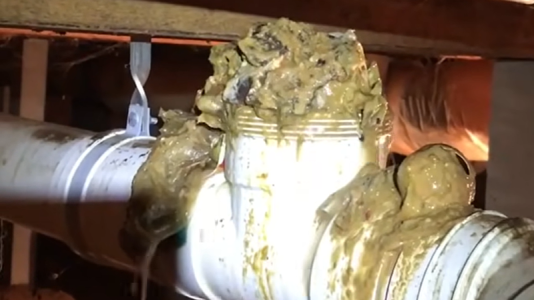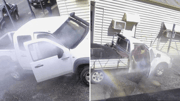One small mistake could cost you thousands—here’s how to avoid a sewage nightmare
By
Maan
- Replies 0
A stinking flood poured from the pipes—and it wasn’t just water.
Homeowners who flushed everyday items down the toilet got a confronting look at what really happens when those “flushable” products vanish from sight.
Now, Sydney Water is issuing a stomach-churning warning that could save you thousands.
Captured by SGT Plumbing, a video shared by Sydney Water on social media showed a horrifying mess caused by a plumbing blockage.
The footage revealed pipes overflowing with a dark, sludgy mix of wastewater, the result of common household items being flushed instead of binned.
‘Still treating your toilet like a bin? Then watch this,’ the post warned.
The clip, filmed near the Mornington Peninsula, made clear just how quickly a drainage system can fail when clogged with non-flushable debris.
Sydney Water explained that while items like wet wipes, tissues, cotton buds and sanitary products may seem to disappear, they often get caught just past the s-bend.
Once stuck, they start to build up and block household pipes—leading to nasty overflows right back into homes and bathrooms.
Non‑flushable wet wipes, particularly those that don’t meet the Flushable Products Standard (AS/NZS 5328:2022), were responsible for around 75 per cent of Sydney’s wastewater blockages.
Other everyday culprits included paper towel, cotton buds, hair, and even fats, oils and grease poured down kitchen sinks.
These blockages didn’t just cause expensive plumbing headaches—they also posed serious health risks.
Wastewater overflows were known to carry bacteria and viruses that could trigger illnesses like gastroenteritis in humans.
They also polluted local waterways and harmed wildlife, according to the utility service.
While Sydney Water managed the city’s public sewer system, any blockage on private property fell squarely on the homeowner—along with the plumber’s bill.
Fortunately, they said these nasty situations were easy to avoid.
‘Only flush the 3Ps—Pee, Poo, and toilet Paper—to steer clear of nasty (and expensive) plumbing nightmares,’ Sydney Water wrote.
They also urged residents to check that any ‘flushable’ products complied with the relevant Australian and New Zealand standard before putting them in the toilet.
If you’ve ever dealt with a backed-up toilet or a slow-draining sink, you’ll know just how stressful unexpected plumbing problems can be.
While some blockages require a professional fix, others can be tackled at home with surprisingly simple solutions.
One story shows how a household item you already own might be all you need to clear a clogged drain—no harsh chemicals or costly tools required.
Read more: Plumbers Hate This! Discover the $0 Trick to Unblock Your Drains Without Expensive Chemicals!

How many of us are unknowingly one flush away from a household disaster?
Homeowners who flushed everyday items down the toilet got a confronting look at what really happens when those “flushable” products vanish from sight.
Now, Sydney Water is issuing a stomach-churning warning that could save you thousands.
Captured by SGT Plumbing, a video shared by Sydney Water on social media showed a horrifying mess caused by a plumbing blockage.
The footage revealed pipes overflowing with a dark, sludgy mix of wastewater, the result of common household items being flushed instead of binned.
‘Still treating your toilet like a bin? Then watch this,’ the post warned.
The clip, filmed near the Mornington Peninsula, made clear just how quickly a drainage system can fail when clogged with non-flushable debris.
Sydney Water explained that while items like wet wipes, tissues, cotton buds and sanitary products may seem to disappear, they often get caught just past the s-bend.
Once stuck, they start to build up and block household pipes—leading to nasty overflows right back into homes and bathrooms.
Non‑flushable wet wipes, particularly those that don’t meet the Flushable Products Standard (AS/NZS 5328:2022), were responsible for around 75 per cent of Sydney’s wastewater blockages.
Other everyday culprits included paper towel, cotton buds, hair, and even fats, oils and grease poured down kitchen sinks.
These blockages didn’t just cause expensive plumbing headaches—they also posed serious health risks.
Wastewater overflows were known to carry bacteria and viruses that could trigger illnesses like gastroenteritis in humans.
They also polluted local waterways and harmed wildlife, according to the utility service.
While Sydney Water managed the city’s public sewer system, any blockage on private property fell squarely on the homeowner—along with the plumber’s bill.
Fortunately, they said these nasty situations were easy to avoid.
‘Only flush the 3Ps—Pee, Poo, and toilet Paper—to steer clear of nasty (and expensive) plumbing nightmares,’ Sydney Water wrote.
They also urged residents to check that any ‘flushable’ products complied with the relevant Australian and New Zealand standard before putting them in the toilet.
If you’ve ever dealt with a backed-up toilet or a slow-draining sink, you’ll know just how stressful unexpected plumbing problems can be.
While some blockages require a professional fix, others can be tackled at home with surprisingly simple solutions.
One story shows how a household item you already own might be all you need to clear a clogged drain—no harsh chemicals or costly tools required.
Read more: Plumbers Hate This! Discover the $0 Trick to Unblock Your Drains Without Expensive Chemicals!
Key Takeaways
- A video showed pipes overflowing due to flushed non-flushable items.
- Wet wipes caused 75 per cent of wastewater blockages in Sydney.
- Household items like tissues, cotton buds, and grease also contributed.
- Sydney Water urged people to only flush the ‘3Ps’ to avoid damage and health risks.
How many of us are unknowingly one flush away from a household disaster?








